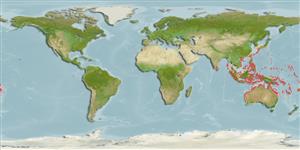Common names from other countries
>
Blenniiformes (Blennies) >
Tripterygiidae (Triplefin blennies) > Tripterygiinae
Etymology: Helcogramma: Greek, helkos, -eos, -ous = ulcer, sore + Greek, gramma = letter, mark (Ref. 45335).
Environment: milieu / climate zone / depth range / distribution range
Sinh thái học
Biển gần đáy; Mức độ sâu 0 - 6 m (Ref. 90102). Tropical
Western Pacific: Widespread in the area, from the Philippines, Viet Nam, Indonesia (Borneo) to the Solomon Islands (Ref. 13227). Recently collected from Fiji and Tonga (Williams pers. comm.). New locality records from Thailand and the Andaman Sea (Ref. 27223).
Bộ gần gũi / Khối lượng (Trọng lượng) / Age
Maturity: Lm ? range ? - ? cm
Max length : 4.0 cm TL con đực/không giới tính; (Ref. 48636)
Short description
Khóa để định loại | Hình thái học | Sinh trắc học
Các tia vây lưng cứng (tổng cộng) : 17 - 18; Các vây lưng mềm (tổng cộng) : 10 - 11; Tia cứng vây hậu môn: 1; Tia mềm vây hậu môn: 20; Động vật có xương sống: 37. Trunk without longitudinal stripes; symphyseal dentary pores 1; upper lip with proboscis-like extension on males, head with horizontal yellowish or bluish white line from the upper rim of upper jaw to opercle (Ref. 94457). Males are easily recognized by the extended nose and change color to display to females with an electric blue line below the eye, shaded by black below (Ref. 48636). Also Ref. 94101.
Adults inhabit clear coastal reefs with algae covered rocky boulders, usually in small groups (Ref. 48636). They occur in very shallow depths on rock surfaces and under ledges (Ref. 48636). Eggs are hemispherical and covered with numerous sticky threads that anchor them in the algae on the nesting sites (Ref. 240). Larvae are planktonic which occur primarily in shallow, nearshore waters (Ref. 94114). Minimum depth of 0 m reported from Ref. 58018.
Life cycle and mating behavior
Maturities | Sự tái sinh sản | Spawnings | Egg(s) | Fecundities | Ấu trùng
Fricke, R., 1994. Tripterygiid fishes of Australia, New Zealand and the southwest Pacific Ocean (Teleostei). Theses Zool. 24:1-585. (Ref. 13227)
IUCN Red List Status (Ref. 130435)
CITES (Ref. 128078)
Not Evaluated
Threat to humans
Harmless
Human uses
Các nghề cá: không ích lợi (thú vị); Bể nuôi cá: Tiềm năng
Các công cụ
Special reports
Download XML
Các nguồn internet
Estimates based on models
Preferred temperature (Ref.
115969): 25 - 29.3, mean 28.6 (based on 2065 cells).
Phylogenetic diversity index (Ref.
82804): PD
50 = 0.5000 [Uniqueness, from 0.5 = low to 2.0 = high].
Bayesian length-weight: a=0.00562 (0.00258 - 0.01228), b=3.08 (2.89 - 3.27), in cm Total Length, based on LWR estimates for this (Sub)family-body shape (Ref.
93245).
Mức dinh dưỡng (Ref.
69278): 3.0 ±0.3 se; based on size and trophs of closest relatives
Thích nghi nhanh (Ref.
120179): Chiêù cao, thời gian nhân đôi của chủng quần tối thiểu là dưới 15 tháng (Preliminary K or Fecundity.).
Fishing Vulnerability (Ref.
59153): Low vulnerability (10 of 100).
